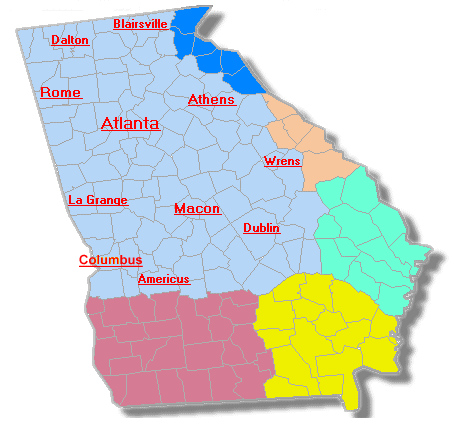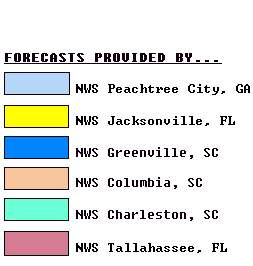

The Georgia Emergency Management Agency (GEMA)-a part of the Office of the Governor-has primary responsibility in the State of Georgia to provide overall direction and coordination of emergency and disaster planning and operations, as stated in the Georgia Emergency Management Act of 1981.
GEMA has responsibility for maintaining the Georgia Emergency Operations Plan (GEOP), which is organized, based on the authority of the state government for emergency management and contains specific Emergency Support Functions (ESFs). Standard Operating Procedures (SOPs) are the responsibility of the primary state agency or organization for each ESF in coordination with other supporting agencies and organizations.
The GEMA Director assumes responsibility for direction and coordination of ESFs at the State Operations Center (SOC), 935 East Confederate Avenue, Building 2, Atlanta, Georgia. At the discretion of the GEMA Director and in concurrence with the Governor, a designated alternate SOC may become operational. Each ESF is assigned to a primary state agency and support agencies through the Executive Order of the Governor. All primary and support agencies responding to an emergency or disaster will be coordinated by GEMA. In addition, other assistance through private agencies/organizations will be coordinated as a part of this process.
The American Radio Relay League (ARRL) is listed as a support organization in the GEOP under ESF #2, Communications. The Georgia Section Amateur Radio Emergency Service is delegated the responsibility for providing this support on behalf of the ARRL by the Section Manager. The Georgia ARES maintains an amateur radio station in the communications center of the GEMA SOC in Atlanta.
A Forward Emergency Operations Center (FEOC), Mobile Communications Vehicle (MCV) and/or a Mobile Command Post (MCP) may be established at or near an emergency or disaster site. In the event a local jurisdiction is unable to perform responsibilities, the GEMA Director may provide support to assist during an emergency or disaster. Presently, the GEMA Mobile Communications Vehicle has Amateur Radio 2-Meter FM capability, but does not routinely have licensed amateur radio operators on staff to use this equipment in a local area. GA ARES operators may be called upon and authorized to operate this equipment depending on the needs of local officials.
ARRL and the American Red Cross have had cooperative agreements since 1940. The current statement was signed in 1994. Chartered by Congress in 1905, the Red Cross provides relief to victims displaced by disaster, from the onset of disaster conditions to the recovery phase. Their national headquarters is located in Washington, but most of the action occurs at the state and local chapter levels, where the rubber meets the road. Local ARES Emergency Coordinators should work closely with their counterparts in the chapter offices.
All American Red Cross activities in the State of Georgia are coordinated through the Southeastern Region/Georgia Unit Headquarters building at 1955 Monroe Dr NE, Atlanta, Georgia. The Metropolitan Atlanta Chapter and the Georgia Hurricane Watch Team are also located in this building.
The American Red Cross has primary responsibility for the GEOP ESF #6, Mass Care and is coordinated with other Georgia state and private agencies through the GEMA SOC. Although not listed in the GEOP, the ARRL provides support to the American Red Cross under ESF #6 through a statement of understanding between the two organizations.
The Skywarn program is the "eyes and ears" of the National Weather Service during severe weather emergencies. Hams comprise the majority of Skywarn volunteers, who report "ground truths" to local NWS offices, supplementing their sophisticated weather monitoring equipment. ARRL has had an agreement with the National Weather Service, effecting this support, since 1986.
The majority of Skywarn activity in the State of Georgia is coordinated through the NWS Peachtree City (NWSPTC) office, 4 Falcon Drive, Peachtree City, Georgia. NWSPTC has a county warning area (CWA) of 96 of the 169 counties in Georgia, but issues forecasts for most of the state. The remaining counties fall under the jurisdiction of Jacksonville, FL, Greenville, SC, Columbia, SC, Charleson, SC or Tallahassee FL.
 |  |
Figure 2. National Weather Service County Warning Areas in Georgia
The Association of Public-Safety Communications Officials-International (APCO) is comprised of communications professionals in emergency medical, law enforcement, fire, SAR, and other public safety fields. Headquartered in South Daytona, Florida, the organization has numerous chapter offices across the country, the level at which ARRL volunteers interface with the organization. APCO-International promotes standardization, education, and information exchange. Amateur Radio is often represented at the organization's annual convention.
The ARRL/APCO MOU calls for pre-planning between local ARRL officials and APCO chapter officers to provide for supplemental communications services by amateurs during emergencies. A new MOU was signed in 1996. National-level coordination occurs between standing committees of both organizations.
The National Communications System is a confederation of 23 organizations across the Federal Government tasked with ensuring the availability of a viable national security and emergency preparedness telecommunications infrastructure. The President designates member organizations that own or lease telecommunications facilities/services of significant value to emergency response or that have important telecommunications policy, regulatory, or enforcement responsibilities. The assets of these 23 organizations comprise the bulk of the Federal Government's telecommunications resources.
Ordinarily, the GA ARES does not directly work with the National Communications System. As necessary, liaisons will be appointed by the Section Emergency Coordinator, at the request of NCS and/or the GEMA.
The Salvation Army is primarily active in the recovery stage of disasters, and has communications needs, often filled by ARRL volunteers. ARRL staff meets with Salvation Army representatives each year at the annual NVOAD meeting in Washington. NVOAD is the National Voluntary Organizations Active in Disaster, of which ARRL is a member-organization. The ARRL and the Salvation Army revised its MOU in 1996.
While REACT has been associated primarily with Citizens Band in the past, the organization has widened its focus to embrace amateur and other services. ARRL and REACT share common goals in terms of emergency communication. The primary mission of REACT is "to provide public safety communications to individuals, organizations, and government agencies to save lives, prevent injuries, and give assistance wherever and whenever needed."
The memorandum of understanding calls on the two organizations to "cooperate and utilize their resources from time to time to optimum mutual benefit to both parties." Among specific principles, the agreement will involve cooperation during emergencies and disaster relief and the elimination of "duplicative or technically inferior service" during such responses. "The parties will generally encourage ongoing liaison with each other and urge members of both organizations to develop increasingly effective communications and cooperation," the agreement states.
Southern Baptist Disaster Relief includes but is not limited to:
There are 15,000 volunteers who are involved in the following additional ways:
In Georgia, the Southern Baptist Disaster Relief Communications groups have two well-equipped mobile communications trailers. In a disaster, they provide communications support for the feeding units, and other disaster relief operations.
Although no formal memorandum of understanding exists between ARES and Southern Baptist Disaster Relief Communications, they work very closely in many disaster situations. Several members of the section ARES leadership are also actively involved with the Disaster Relieve Communications groups. This can only serve to enhance the amateur radio response to the community in a disaster, as each group can rely upon the strengths of the other.
MARS is a US Department of Defense sponsored program, established as a separately managed and operated program by the Army, Navy, and Air Force. The program consists of licensed amateur radio operators who are interested in military communications on a local, national, and international basis as an adjunct to normal communications.
MARS has a long and proud history of providing world-wide auxiliary emergency communications during times of need. Our volunteer force of over 5,000 dedicated and skilled amateur radio operators is the back bone of our program. The benefit of MARS membership is enjoying an amateur radio hobby through the ever-expanding horizon of MARS. Our affiliate members' continued unselfish support of our mission keeps Army MARS Proud, Professional, and Ready.
The Georgia Section ARES has District Emergency Coordinators assigned to all three MARS groups, with the specific responsibility to establish liaisons with MARS in the event of a disaster. Although any necessary traffic will be passed, health and welfare traffic is expected to be the predominate type of message flow.The purpose of the Hurricane Watch Net is to:
The Georgia Section ARES does not have a formal liaison to the Hurricane Watch Net, since it's primary mission is to disseminate advisory and gather weather information from affected areas. As such, it is a very narrow focused net. All ARES members should monitor the net whenever it is in session on 14.325 MHz or 3.950 MHz (when band conditions warrant). When a liaison to the HWN (or National Hurricane Center in Miami, Florida) is required, that liaison will be assigned as needed by the Section Emergency Coordinator (or appropriate District EC as needed).